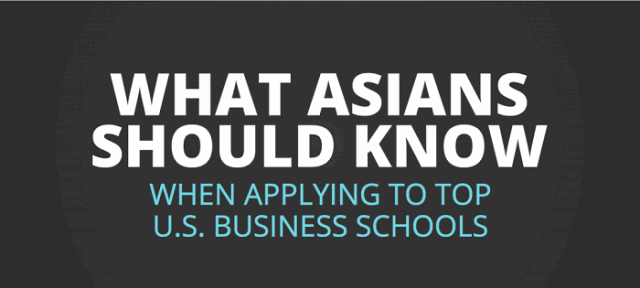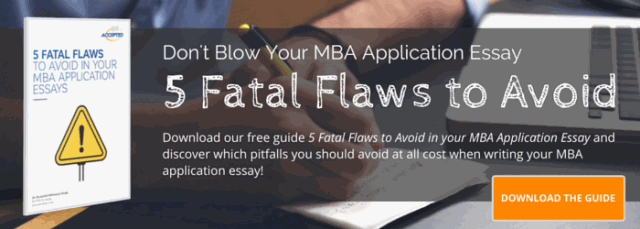Three Challenges Asian Applicants Must Overcome when applying to Top U.S. MBA Programs
When I moved to Hong Kong in 2012, I spent much of my free time advising coworkers on getting into a top U.S. business school. Combined with my experience working for MIT Sloan School of Management and recently Yale SOM, I found that understanding the challenges Asian applicants face is the key first step for them to gain admission into business school. Coming from a different cultural background will have a huge impact on your potential opportunities. However, it also presents pitfalls to avoid.
Challenge #1: Lower Acceptance Rates for Indian, Chinese and Hong Kong applicants
The Good News:
Almost all top U.S. MBA programs value diversity. Diversity adds value to the depth of classroom discussions and many schools take pride in their percentage of international students.
The Bad News:
The number of international students to top U.S. business schools varies widely by geography. Unfortunately, one of the challenges that Chinese and Indian applicants face when applying to business school is that the overall number of applicants from these regions is much larger relative to the U.S. applicant pool and other international regions. As a result, it is harder for Chinese or Indian applicants to get accepted, and acceptance rates tend to be lower for these demographics.
Challenge #2: Higher GMAT Scores
GMAT scores (on average) for Asian applicants tend to be higher than for their American counterparts. What does that mean for you as an applicant? In order to stand out among your “peer applicants,” your GMAT score has to be on par or higher than the people you compete with for a spot in the MBA class.
Challenge #3: Cultural Differences
There are significant cultural differences between Asia and the U.S. that impact the way Asian applicants should approach their business school applications.
Here are a few considerations:
• Asians cultures tend to have a greater sense of modesty than Americans. For example, resumes from Asia often don’t focus on quantifiable achievements and figures. By incorporating achievements that are meaningful and show business impact, you (as the applicant) can take the first step in distinguishing yourself from the crowd. The most important advice in this context is write bullet points that are as specific as possible. Think about answering questions such as: What did you do and how did your actions directly improve your business, department, team, or project?
• Cultural differences often impact the essay part of the application as well. Indian applicants for example tend to be more verbose in their writing style than Americans. These patterns can frustrate the admissions reader who is typically assigned geographically and is stuck reading essay after essay with the same repetition and verbosity. You (as the applicant) can turn this pattern to your advantage by focusing on concision and precision in your essays. Write with a clear theme and structure. Don’t go off on a tangent that doesn’t support the overall theme of your essay. Avoid repetition and use of multiple synonyms.
• At the interview stage: Americans tend to maintain eye contact in conversation. Furthermore, eye contact in combination with a firm handshake, the right body language and the absence of a soft-spoken voice often signals character and trustworthiness in the Western Hemisphere. Asian applicants in contrast, most likely grew up with different cultural norms where eye contact is considered less appropriate and greetings often include a bow and a business card that has to be passed on with both hands in order to be polite. While these differences appear small, they can have a huge impact on the outcome of interviews and video formats.
What do these suggestions mean for you?
• Your application needs to stand out among a larger number of competitors, but specifically the competitors from your country or region, your direct peer group.
• You can’t just rely on a high GMAT score to gain admission to a top MBA program. There needs to be more to your story.
• Your essays need to be authentic and tell a convincing story. The most crucial piece of advice: take your application beyond your technical and quantitative expertise. You’re a person, not just a number-cruncher. Tell your story and do it well!
• Apply early, if you can.
• If you happen to be lucky enough to snag an interview, it is crucial to ace it. There are many cultural traps that can trip up highly qualified Asian candidates. Practice, practice, practice. Even better, hire someone who knows what they are doing to practice with you.
A word about MBA admissions consultants: If you opt to work with a consultant, do your due diligence and hire a consultant who understands what the U.S. MBA admissions offices are looking for and how to overcome these (and other) challenges. While it might be more comfortable and possibly cheaper for you to hire a local consultant, the easiest option isn’t often the best one. And a “cheap” one, can be very expensive in the long run.
Check out our services section to learn how one of my colleagues or I can help YOU maximize your competitive advantage and get admitted to your dream school.
Madelaine Baker has worked in the admissions offices of MIT Sloan and Yale SOM. She has an MBA from CBS and corporate banking experience in NYC and Hong Kong. Would you like Madelaine to help you get accepted? Click here to get in touch!
Related Resources:
• Stand Out! A Critical Goal for Your Application, a podcast episode
• Are you selling yourself short?
• “I’m Smart, Really I Am!” Proving Character Traits in your Essays
This article originally appeared on blog.accepted.com.
Applying to a top b-school? The talented folks at Accepted have helped hundreds of applicants get accepted to their dream programs. Whether you are figuring out where to apply, writing your application essays, or prepping for your interviews, we are just a call (or click) away.
Contact us, and get matched up with the consultant who will help you get accepted!



